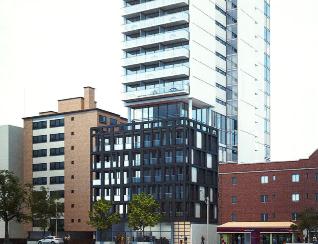A 29-storey tower could soon loom over the Church-Wellesley intersection where the former Wellspring Cancer Centre once stood if developers have their way. However, opposition from community members and Councillor Kristyn Wong-Tam may yet derail their plan.
Icarus Developments is planning a 93.6-metre building made of two towers that step up from a six-storey brick podium. The plan calls for retail at ground level and 200 residential units in the tower, including 20 “family-sized” three-bedroom units. It would have 75 parking spots and 200 bike parking spots.
The 19th-century building was torn down in January in a move that caught the community by surprise. It was on its way to being listed as a heritage property before the wrecking crew levelled it, but the project manager for the development says the owners had been planning to demolish since they took possession in April 2011.
“They were always planning to tear it down,” Kevin Chan says.
Community members invited to a Oct 16 consultation on the condo plan were vocal about their opposition to the building.
For Paul Farrelly, an active member of the Church-Wellesley Neighbourhood Association, the entire proposal is doomed by the owner’s destruction of the Wellspring building.
“The nature of the owner of this property is un-civic,” he says. “It was immoral, un-civic and a blast to the community.”
But the proposal faces several other obstacles. Although Wellesley Street is generally zoned for tall buildings, 81 Wellesley itself is considered part of the low-rise Church Street zone, which has a maximum height of 18 metres.
Additionally, the official plan calls for towers to be set back at least 12.5 metres from the street, which would push the tower right off the site.
Another concern is that due to the narrowness of the site, drivers would enter the parking lot from the front of the building, descend to the lot by car elevator, and exit via the building’s rear laneway.
As that laneway is frequently occupied by trucks making deliveries to the businesses along the east side of Church Street, there’s concern that the additional traffic would not fit through the lane or would force deliveries to be made along Church itself.
Residents in the adjacent buildings are also concerned that the building would block sunlight, given that the podium is being built right to the lot line. However, even if the tower proposal is scrapped, the developer has the right, under current zoning laws, to build a six-storey building right to the lot lines.
Councillor Wong-Tam says she “will not be supporting” the proposal and says she does not believe the site is appropriate for a tall building.
Icarus has not submitted its proposal to the city formally, but Chan says it will be forthcoming in the next month.
In other neighbourhood development news, a contentious proposal to build two 58-storey towers at 501 Yonge St, between Alexander and Maitland, appears to have hit a snag.
The design review panel, a committee of architects that evaluate the merit of new buildings on Yonge Street, told the developer and community on Oct 16 that the proposal needs to go through a redesign.
Members of the panel said the site is too close to an adjacent building on Maitland to allow two towers to be built, community members report.
“I always felt there was too much massing on the site, and I’ve repeatedly asked the developer to bring the density down,” Wong-Tam says.


 Why you can trust Xtra
Why you can trust Xtra


